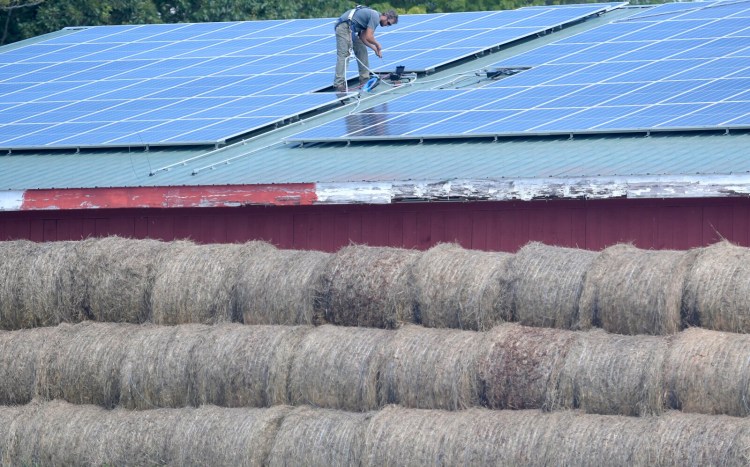In 15 years, The Milkhouse in Monmouth will no longer have energy payments.
The dairy farm recently installed 192 solar panels on the roof of a winter cow-housing barn, which will be online in the next couple of weeks, according to Caitlin Frame, who owns The Milkhouse with her partner, Andy Smith.
The solar array, installed by Insource Renewables of Pittsfield, is a 72-kilowatt, roof-mounted system.
“We estimated it would save us about $10,000 a year and generate around 70,000 kilowats hours annually, which will replace all of the energy needs of our business,” Frame said. “Cost over time is important to us, as well as the principle of solar energy is for our business and as a symbol in the community. We are excited about it.”
The Milkhouse is getting a boost from the government to undergo the transition, with a pair of grants helping defray the cost of the panel installation. It received a $36,393 grant from the Rural Energy for America Program under the U.S. Department of Agriculture, as well as a $10,000 grant from the Androscoggin Valley Council of Governments.
The remainder of the cost was financed through a commercial loan.
The two grants greatly reduced the payments on the loan, Frame said, and that the payments will equal what they have already been paying in electricity costs.
“In 15 years, when we own the (solar) system, we will not have the electricity payments anymore,” she said.
The dairy has about 100 head of cattle, milking 30 to 40 cows at a time, and producing up to 200 gallons of milk a day. Cows are milked with a pipeline system that’s run with a vacuum pump, and Millkhouse also has an on-farm creamery.
The milk is sold bottled and as yogurt, and Frame and Smith also sell to colleges, school districts and a creamery in Freeport. The yogurt and milk are certified organic by the Maine Organic Farmers and Gardeners Association.
The farm, which employs six people, five of whom are full time, along with Frame and Smith, also sells beef, eggs and pork — between 40 to 60 pigs annually. It also makes hay, mulch and bedding for the livestock.
“There is a lot of energy use on the farm in general,” Frame said.
Part of the 2018 Farm Bill, the REAP provides grant or loan assistance for businesses in rural areas, providing 25% of the total project cost for renewable energy installation or energy efficiency improvement work.
Cheryl Pelletier, USDA’s area director of its Rural Development program in Presque Isle, said REAP is used either for installation of renewable energy systems or for energy efficiency upgrades.
“Solar is extremely popular,” she said. “We see a lot of that in Maine.”
Grants and loans have also been awarded for installation of biomass, geothermal, wind power and hydropower. Typical energy efficiency upgrades are made on equipment, heating, cooling and ventilation systems, lighting, equipment and on doors and windows.
The Androscoggin Valley Council of Governments portion came from a farm energy innovation grant for organic farms, said AVCOG executive assistant Lisa Bonney, with funding for that provided by the Elmina B. Sewall Foundation.
West Paris-based Cooper Farms Inc. received a REAP-guaranteed loan of $1,312,500 in 2018, according to the USDA’s Rural Development office in Bangor. This allowed the business to install a new apple-sorting machine, which is anticipated to save 8,652 kilowatt-hours of electricity annually.
Twelve other businesses in the state were awarded together $156,000 in grants in June, according to the USDA.
“The application is competitive and all applications are scored,” Pelletier said.
The grant opportunity had been on their radar, Frame said, since the couple purchased the farm in 2015.
“It was a goal of ours to put in a solar installation,” Frame said.
The couple got their start in the dairy business when they bought milk from the farm where they worked in South China in order to make yogurt.
Their Monmouth property has has been a working, family-owned farm since the 1920s, historically for dairy.
Send questions/comments to the editors.




Success. Please wait for the page to reload. If the page does not reload within 5 seconds, please refresh the page.
Enter your email and password to access comments.
Hi, to comment on stories you must . This profile is in addition to your subscription and website login.
Already have a commenting profile? .
Invalid username/password.
Please check your email to confirm and complete your registration.
Only subscribers are eligible to post comments. Please subscribe or login first for digital access. Here’s why.
Use the form below to reset your password. When you've submitted your account email, we will send an email with a reset code.